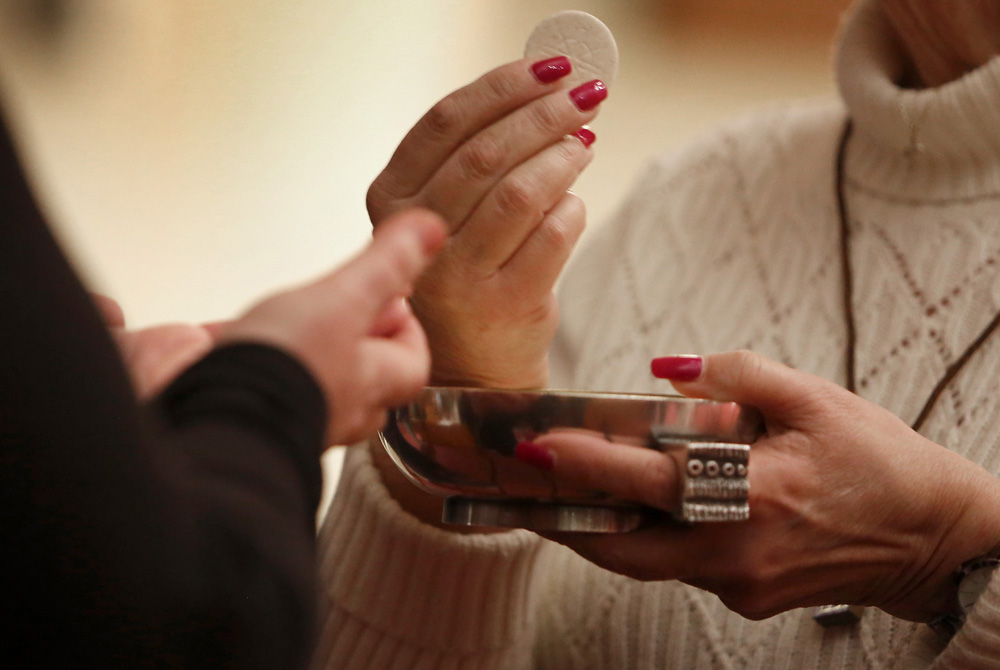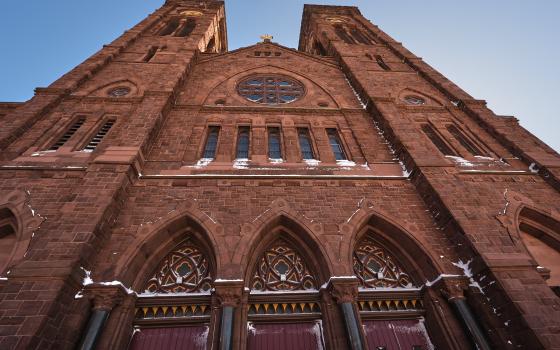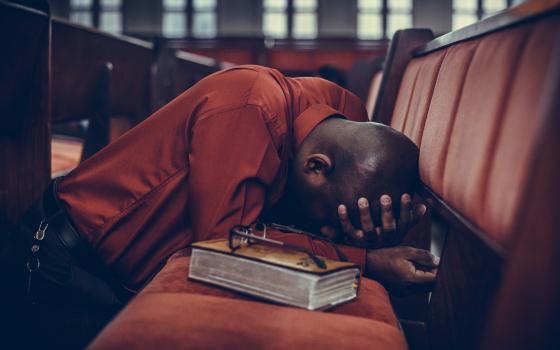
A eucharistic minister distributes Communion in this CNS file photo (CNS photo / Karen Callaway, Chicago Catholic)
The first person who taught me eucharistic theology was my Lutheran grandmother. Although I have no memories of her ever uttering the words "eucharistic" or "theology," she taught me in the way that the best teachers do: by being a living example.
Grandma's house usually smelled like freshly baked bread. Her counter was often dusted with a layer of flour and she frequently had dough under her fingernails. My grandma structured much of her time around a pattern of stirring, kneading, baking, cooking or serving meals and snacks. No matter who came through the sunny porch, she offered the person a warm hello and an embrace.
Nearly every day at noon, neighborhood kids (along with me, my siblings and cousins) and farmers and friends would squeeze around a large table, where there was always room for one more plate, one more body. We'd all give thanks for the food (Eucharist means "thanksgiving"), then eat and laugh and hear stories about goodness. No one could leave Grandma's house hungry, or without feeling welcomed, loved and accepted; it made no difference who you were or what you'd done.
Once I started studying the Gospels I noticed that Jesus shared a lot of meals with people who were usually excluded and judged sinful. The images of Jesus at the table lined right up with my fond memories of meals of Grandma's house, where I first experienced inclusivity and hospitality.
Later my studies of church history and sacramental theology helped me to discover that the bread and wine shared at Communion, the Eucharist, are symbols of unity. Christians in the early church experienced eucharistic worship as both an expression and a source of unity, as a both-and experience wherein the ritual helped intertwine belief and experience. Celebrating the Eucharist together was once considered the most effective way to pray for unity in the church. This understanding remains the basis for much eucharistic practice to this day.
The Eucharist's equation with unity is natural and appropriate. Yet it can be problematic because it introduces questions about who is worthy of being included, of who the unity is for. It tugs at our tribal tendencies—our temptation to declare who is in or out, who belongs and doesn't. Grandma's house was a safe place for me during a childhood fraught with the struggles of being odd, of learning how I fit, and of finding where I belonged.
The Eucharist has served as a symbol of power for centuries, but maybe in a different way than power is wielded today. In 1202, Pope Innocent III wrote: "We must, however, distinguish accurately between three things which are different in this sacrament, namely, the visible form, the truth of the body, and the spiritual power. The form is of the bread and wine; the truth, of the flesh and blood; the power, of unity and of charity." The power of the Eucharist is charity and unity.
Once the upset to Christian unity occurred in the Reformation, the Eucharist became part of the mess. Although Martin Luther never strayed from church doctrine on the Eucharist, he was turned away from the table and from Communion with the body of believers by his excommunication. The scholar Joseph Martos has written, "Apart from the Anglicans, the reformer who had the most Catholic attitude toward the Mass and Eucharist was Martin Luther." Because Luther challenged the people in power, the spiritual power of the Eucharist was denied him.
In the 500 years since the Reformation, we seem to have cycled back into Communion wars with questions of unity and power. The controversy surrounding the recent refusal of Communion to presidential candidate Joe Biden has seeped beyond the Catholic Church walls; the heated arguments for and against have been heard in secular media such as MSNBC and Fox News along with Catholic press such as America, and the National Catholic Reporter.
When asked about the situation, which occurred at a parish in South Carolina on Oct. 27, Cardinal Dolan commented, "If only saints could receive Holy Communion, we wouldn't have anybody at Mass, including myself. … Holy Communion is medicine for the soul; it's an act of mercy. So, it's intended for sinners, but sinners who are sorry and want to repent. Then anybody's welcome, come on up." Dolan also commented that the priest who denied Biden Communion had a good point.
Biden was refused Communion on the basis of his stance on abortion, including his announcement in June of this year that he no longer supports the Hyde Amendment, which prevents federal funds from being used to pay for abortion procedures. Once I understood what this meant, my heart sank. I could hear the voice of one of my Catholic friends in my head saying, "Abortion is the worst human rights violation of our time." Considering that it kills about half a million people each year, I find myself agreeing. And, yet, I recognize that pro-life voting need not be partisan.
The situation is complex, the result of how the matters of politics and faith inevitably get mixed together. The denial of Communion to politicians over their public positions on moral matters is not new, nor is it outside of Church teaching and practice.
I don't envy the position of the priest who denied Biden communion, Fr. Robert Morey. It's the official policy of the Diocese of Charleston that priests must deny communion to politicians who publicly support abortion. Meanwhile, a statement from Biden's home diocese of Wilmington, Delaware, said that Bishop Francis Malooly "has consistently refrained from politicizing the Eucharist, and will continue to do so. His preference, as with most bishops, is to interact with politicians individually who disagree with significant church teachings."
Advertisement
All of it — the policies and laws, the abortions, the judgment and the turning away some from the table — seem like a giant mess to me, a situation of sinners struggling to be faithful and love as Jesus has taught us to do, all while we battle about the culture and society we share. Together and somewhat united, we are trying to find our way into the kingdom of God that Jesus announced; we all are grappling for the truth in the midst of temptations to misuse the Eucharist to make a statement, or pretend as if nothing is pushing against the unity to which we're called.
The value of people taking the Eucharist seriously reminds me of what the Eucharist really means; it teaches me about the unity that it represents and that we're aiming to know. Church teaching tells us that what we say and do should be united; our beliefs and actions should be joined. I have told others that they shouldn't receive Communion from a Catholic altar if they aren't prepared or united with us in belief because this makes sense to me.
The loving example of grandmother leads me to question what it means to share a table with sinners, myself included. I wonder how we all might live out the example of Jesus today, and sit together at the table of mystery, hold our struggle to be united, even while public policy and the church that we're devoted to are in conflict. I don't yet have answers, but I suspect the answer is in the mystery of the Bread.
[Sr. Julia Walsh, Franciscan Sister of Perpetual Adoration, is a retreat director, speaker, educator, activist and award-winning writer who blogs at MessyJesusBusiness.com. Follow her on Twitter: @juliafspa.]






